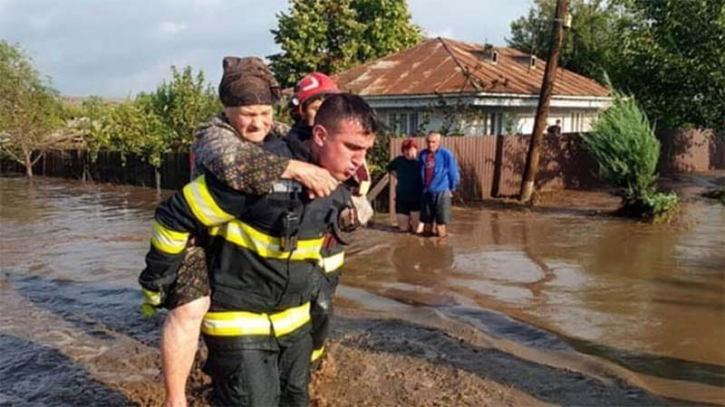Storm Boris Causes Devastation Across Eastern and Central Europe

Four people have lost their lives in Romania due to severe flooding triggered by Storm Boris, which has unleashed torrential rain and caused widespread disruption across central and eastern Europe, according to rescue services on Saturday.
Since Thursday, large areas of Austria, the Czech Republic, Hungary, Romania, and Slovakia have been hit by powerful winds and unusually heavy rainfall.
Romanian President Klaus Iohannis commented on the situation, stating, "We are once again witnessing the effects of climate change, which is becoming increasingly evident across Europe, with devastating consequences. We must continue to enhance our ability to anticipate extreme weather events."
In Romania's worst-hit region, Galati, in the southeast, four bodies were found, and 5,000 homes have been damaged. Rescue services reported that hundreds of people have been rescued across 19 regions of the country. A video was released showing flooded homes in a village along the Danube river.
“This is a catastrophe of epic proportions,” said Emil Dragomir, mayor of Slobozia Conachi, a village in Galati where he reported 700 homes had been flooded. Prime Minister Marcel Ciolacu has visited the affected area, while President Iohannis extended his "condolences to grieving families."
In the Czech Republic, approximately 100,000 firefighters were deployed as nearly 2,900 incidents were recorded on Friday, mostly due to fallen trees and flooding. Czech energy provider CEZ reported that almost 50,000 homes were without electricity on Saturday, and a hospital in Brno, in the southeast, was evacuated.
Environment Minister Petr Hladik expressed concern, stating on X, formerly known as Twitter, “The ground is now saturated, so all the rainwater will remain on the surface.”
In Austria, rail services were suspended in the eastern part of the country early Sunday, and several metro lines in Vienna were shut down as the Wien river threatened to overflow, according to the APA news agency. Emergency services conducted nearly 5,000 interventions overnight in Lower Austria, where many residents were trapped in their homes by flooding.
Neighbouring Slovakia has declared a state of emergency in the capital, Bratislava. In Poland, the government has warned that the southwest will face the most challenging conditions into Saturday afternoon and evening. Authorities have closed the Golkowice border crossing with the Czech Republic after a river overflowed, blocked several roads, and halted train services between Prudnik and Nysa.
In the village of Glucholazy, Zofia Owsiaka watched with dread as the Biala river surged. "Water is the most powerful force of nature. Everyone is frightened," said 65-year-old Owsiaka. Another resident, Piotr Jakubiec, 39, added, “This is only the second time in my life I’ve seen such a phenomenon. It’s a nightmare for the people here.”
In Austria, winds reached 146 km/h (91 mph) in the south, and firefighters in Vienna have responded to around 150 incidents since Friday, clearing roads blocked by debris and pumping water from cellars. Four thousand homes in the Styria region are without power, and Chancellor Karl Nehammer warned that the "worst is yet to come."
In the mountainous regions of western Austria, heavy snowfall has disrupted traffic, with some areas receiving up to a metre (three feet) of snow, an unusual occurrence for mid-September, which had recorded temperatures as high as 30°C (86°F) just last week. Rescue services are searching for a man missing after an avalanche, and parts of northeast Austria have been declared disaster zones.
 (5).png)








